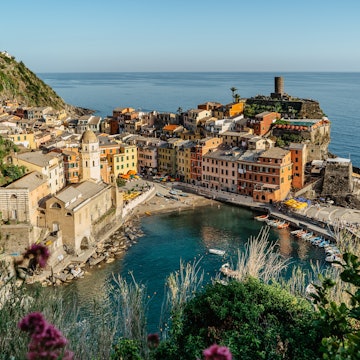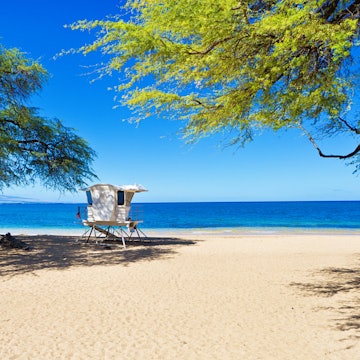

Explore Vienna one neighborhood at a time with this guide. arcady_31 / Getty Images
Year after year Vienna comes top of the class in quality of living surveys and it doesn’t take a genius to figure out why.
Sitting astride the Danube, the Austrian capital strikes perfect balance between the urban and outdoors. Culturally it packs an enormous punch with palaces, galleries, concert halls and coffee houses, and it’s officially the world’s greenest city (with over half of it given over to parks, meadows and forests).
There’s no need to tie yourself to one neighborhood - here you can easily get a taste of the 23 districts radiating out from the historic center (Innere Stadt) like the spokes on a wheel. An excellent public transport and cycling network means you can zip from one to the next by U-bahn, tram or bike in a matter of minutes, so bear that in mind when choosing where to stay. Even if you’re in an outlying neighborhood, you’ll rarely be more than half an hour away from the buzz and big-hitters of the 1st district.

1. The historic center
Best for pomp and palaces
For that "wow, I’m in Vienna" moment, begin in the sight-rammed 1st district, Innere Stadt, encircled by the monumental 19th-century Ringstrasse boulevard. Here you’ll feel the pulse of history on every street corner. Lavish Hapsburg palaces, chandelier-lit coffee houses from Sacher to Central, concert halls like the Staatsoper and Musikverein reverberating to the world’s finest orchestras, baroque houses where Mozart and Beethoven composed operas and symphonies – this is Vienna in an ever-so-grand nutshell.
But it’s no secret, of course. Base yourself here to be in the thick of the action but be prepared for top-dollar room rates and madding tourist crowds – especially during high season and when the Christmas markets sparkle.
If it’s your first time in Vienna, you’ll want to kick off here. Towering above the skyline is the city's gigantic Gothic cathedral, Stephansdom. Cobbled lanes and stately streets, like Vienna’s elegant Graben, are lined with pastel-daubed baroque buildings that harbor posh boutiques, delis, cafes, restaurants and wine bars like Die Weinorgel Wien in a former monastery vault.
Fiaker (horse-drawn carriages) clip-clop south to the Hofburg, an imperial palace to outpomp them all and HQ to Hapsburg royals for 600 years. Here you can swan around opulent state apartments, swoon over ballet dancing Lipizzaner stallions at the Spanish Riding School and hear the cherubic Vienna Boys’ Choir sing Sunday mass at the Burgkapelle.
2. Karlsplatz, Naschmarkt and around
Best for street food, boho vibes and art treasures
You don’t have to stray far from the center to find Vienna moving to an edgier, artier, more alternative beat in the 4th district, Wieden. Here the cultural showstopper is Karlsplatz, where you’ll be drawn to the baroque magnificence of the domed, exuberantly frescoed Karlskirche. Popping up above Resselpark, Otto Wagner’s flower-embellished, gold-kissed pavilions are beautiful examples of Jugendstil (art nouveau). Check out the Secession, too – a filigree gold-leaf domed marvel that the Viennese nickname the "golden cabbage," which hides Klimt’s stunning 34m-long (112ft) Beethoven Frieze in its basement.
A quick leap west, Vienna’s famous Naschmarkt tempts with produce-laden stalls brilliant for picnic grazing, street food stands, delis, a Saturday Flohmarkt (flea market), plus a generous sprinkling of cocktail bars, pubs and clubs nearby. Slip away from the crowds in the lanes of the villagey Freihausviertal, unfurling to the south. Here you can tune into a less-touristy Vienna with a mooch around indie galleries, vintage and upcycling shops, boho bars and cute cafes like retro-cool Vollpension, where Omas (grandmas) bake cakes the old fashioned way.
Between the Naschmarkt and the high-street shopping mile Mariahilfer Strasse in the 6th district (also known as Mariahilf), Gumpendorfer Strasse delivers a flurry of upbeat restaurants and bars. Beisln (taverns) and low-key cafes fill its side streets. You’ll find a similar local flavor around Margaretenplatz in the adjacent 5th district, Margareten.

3. Prater and East of the Danube
Best neighborhood for parks and families
Welcome to one of Vienna’s most hip and happening neighborhoods – the city’s Jewish quarter, Leopoldstadt. Bookended by the Donaukanal (Danube Canal) and the Donau (Danube River), Vienna’s 2nd district has exudes an air of newfound cool, with a bristle of glittering skyscrapers, graffiti art, canalside beach bars and a raft of boutiques, restaurants, galleries and artsy cafes tucked down its still-peaceful, relatively non-touristy backstreets, especially around the Karmelitermarkt. Boutique hotels and one-of-a-kind B&Bs are constantly popping up in this creative corner of town.
For families, the biggest draw is the Prater, a vast swathe of greenery twice as big as New York’s Central Park, with chestnut tree-lined avenues to roam and all the fun of the fair at the kid-pleasing Würstelprater, where the iconic 19th-century Riesenrad (Ferris wheel) of 1949-movie The Third Man fame gently turns. Nearby is the Donauinsel (Danube Island), a summer magnet where you can join the Viennese to swim, sunbathe, cycle, stand-up paddleboard or chill at an urban beach bar.
4. Alsergrund and University District
Best neighborhood for student life
Sidling up to the Innere Stadt to the northwest are the 8th district, Josefstadt, and the 9th district, Alsergrund, which center on Vienna’s highly esteemed university, founded in the 14th century and now an architectural showstopper in Italian Renaissance style. Filled with churches and leafy squares, this neighborhood is more about getting a slice of local life than randomly ticking off sights, but there’s the occasional treasure, such as the Sigmund Freud Museum, where the "father of psychoanalysis" bashed out theories for 47 years before fleeing the Nazis in 1938.
Students hang out in the area’s cavern-like cafes, bars, indie live music venues and shaded beer gardens. In the warmer months, everyone flocks to the waterfront Summerstage, for gigs, street food and parties along Rossauer Lände, on the banks of the Donaukanal (Danube Canal). While there are few hotels and B&Bs in this enticing neighborhood, you’ll often find short-term apartment rentals here.

5. Museum District and Neubau
Best neighborhood for creativity and Christmas markets
If you’re in Vienna for art and design (wise move), the culturally on-the-ball 7th district, Neubau, pushes all the right buttons and is just a joyous skip from the Innere Stadt. You can gallery hop here for days without coming up for air and the backstreets positively fizz with creativity, with designers rolling out fashion, bags, jewelry, bags, cool homewares and furniture in their ateliers. The neighborhood is sprinkled with creative hostels, pensions and hotels.
High on any agenda should be the twin neoclassical palaces sheltering the Naturhistorisches Museum, winging you from dinosaur bones to meteorites, and the vast, staggering Kunsthistorisches Museum, whisking you from Ancient Egypt to Old Master paintings.
Just opposite, the creative heat is turned up in baroque imperial stables reborn as the colossal MuseumsQuartier arts district. Here you could easily spend an entire day immersed in museums like the Expressionism-centric Leopold Museum (home to the world’s biggest Egon Schiele collection) and contemporary art stunner mumok, as well as music, theater, dance venues, shops, cafes and bars in its courtyards.
This is an terrific neighborhood for Christmas market season. Ice skaters twirl alongside stalls selling wooden toys, festive decorations, sizzling Würstel (sausages) and steaming Glühwein (mulled wine) at the enchanting Christkindlmarkt, which sets up on Rathausplatz in front of the neo-Gothic Rathaus (City Hall) during advent. Or for a more Viennese vibe, check out the Christmas market spilling through the lanes of Neubau’s cobbled Spittelberg quarter instead.
6. Schloss Belvedere to the Canal
Best neighborhood for baroque brilliance and parks
Rising high and mighty above landscaped, mythical sculpture-strewn, fountain-splashed gardens and with knockout views of the skyline, the sublimely baroque Schloss Belvedere palace can easily absorb a day of your time. Top billing goes to the Oberes Belvedere (Upper Belvedere) – housing Klimt’s The Kiss – state apartments and ceremonial rooms in the Unteres Belvedere (Lower Belvedere) and contemporary works by Austrian artists in the Belvedere 21 pavilion.
Dip into the surrounding 3rd district, Landstrasse, and you’ll discover a fairly low-key base for exploring Vienna, with elegant backstreets filled with cafes, bookshops and restaurants, particularly on and around Landstrasser Hauptstrasse. Sight-wise, beyond the palace, it’s worth seeking out Friedensreich Hundertwasser’s wonky-walled, crazily colorful houses and art, including the kaleidoscopic KunstHausWien.
Paths twist through the greenery of the Stadtpark (City Park) along the Wien River, which flows into the Donaukanal. Boutique hotels and B&Bs sprouting up around the park provide charming digs for striking out into the neighborhood.
















